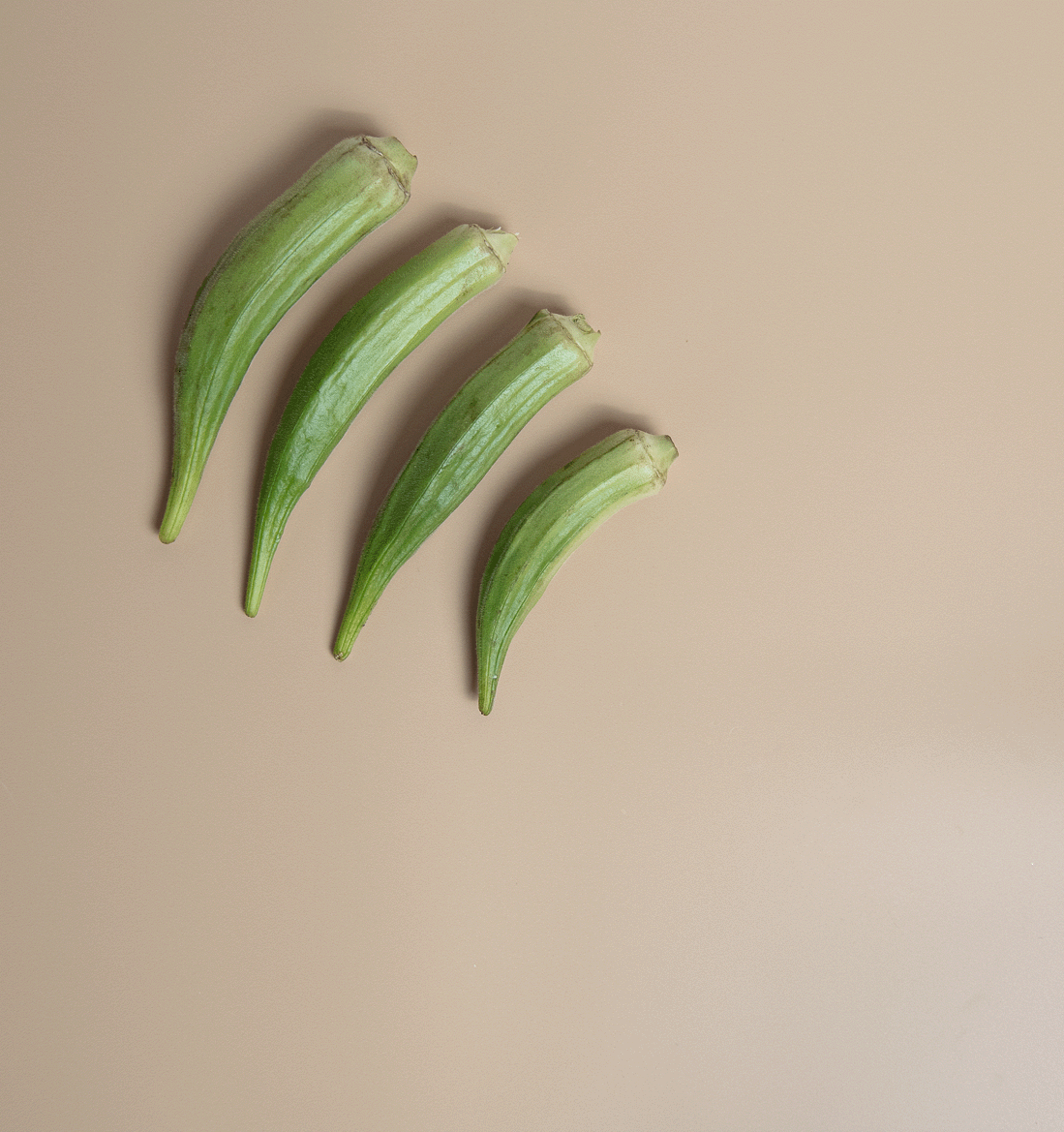SCIENCE | NUTRITION
Okra
Okra (Abelmoschus esculentus) is a nutrient-dense vegetable, rich in fiber, antioxidants, and polyphenolic compounds. It has been shown to help regulate blood sugar levels, improve lipid profiles, and offer anti-inflammatory benefits, making it a valuable addition to a balanced diet, particularly for those with type 2 diabetes.

PUBLICATIONS
- Effect of Abelmoschus esculentus L. (Okra) on Dyslipidemia: Systematic Review and Meta-Analysis of Clinical Studies
- Int J Mol Sci. 2024 Oct 10;25(20):10922. doi: 10.3390/ijms252010922
- Design: Systematic Review and Meta-Analysis of Clinical Studies
- Summary: This study aimed to assess the potential impact of Abelmoschus esculentus (Okra) on dyslipidemia. Evidence from eight studies with nine treatment arms showed that Okra reduced total cholesterol, triglycerides, and LDL, while increasing HDL. The remedy significantly improved lipid profiles in prediabetes, T2D, obesity, and diabetic nephropathy. Future studies should focus on standardizing effective dosages and designing well-powered trials for reliable results.
- Effects of dried okra extract on lipid profile, renal function and some RAGE-related inflammatory genes expression in patients with diabetic nephropathy: A randomized controlled trial
- Complement Ther Med. 2024 May;81:103027. doi: 10.1016/j.ctim.2024.103027
- Design: Randomized Controlled Trial
- Summary: This study aimed to assess the effects of dried okra extract on lipid profile, renal function, and RAGE-related inflammatory gene expression in diabetic nephropathy patients. Results showed no significant differences in lipid profile, kidney function, or inflammatory markers after 10 weeks of supplementation. The study concludes that 125 mg of dried okra extract did not lead to significant changes in the markers studied.
- Clinical efficacy and safety of okra (Abelmoschus esculentus (L.) Moench) in type 2 diabetic patients: a randomized, double-blind, placebo-controlled, clinical trial
- Acta Diabetol. 2023 Dec;60(12):1685-1695. doi: 10.1007/s00592-023-02149-1
- Design: Randomized, Double-Blind, Placebo-Controlled Clinical Trial
- Summary: This clinical trial assessed the efficacy and safety of okra as an adjunct treatment for type 2 diabetes. Results showed that okra supplementation (1000 mg three times a day) for three months significantly improved lipid profiles, glycemic control, and chronic inflammation in type 2 diabetic patients without notable adverse effects.
- Anti-hyperglycemic effect of Abelmoschus culentesus (Okra) on patients with diabetes type 2: a randomized clinical trial
- Phytother Res. 2022 Apr;36(4):1644-1651. doi: 10.1002/ptr.7341. Epub 2022 Mar 18.
- Design: Randomized clinical trial
- Summary: This study investigated the effect of Okra whole fruit on blood glucose levels in Type 2 diabetes patients. The okra group received 1,000 mg of A.esculentus whole fruit capsules every 6 hours for 8 weeks. Results showed significant reductions in fasting blood sugar (FBS), blood sugar (BS), and hemoglobin A1C (HgA1c) in the okra group compared to the control group, highlighting its promising anti-hyperglycemic effects.
- Pressurized Hot Water Extraction of Okra Seeds Reveals Antioxidant, Antidiabetic and Vasoprotective Activities
- Plants (Basel). 2021 Aug 10;10(8):1645. doi: 10.3390/plants10081645.
- Design: Laboratory study
- Summary: This research explored the antioxidant and antidiabetic effects of okra seeds using pressurized hot water extraction (PHWE). The study found that okra seeds exhibited the highest antioxidant capacity and antidiabetic effects, likely due to their rich polyphenolic compounds. They also demonstrated vasoprotective activity by reducing vascular inflammation. The study did not specify a daily dose but used PHWE extraction at various temperatures to analyze the biological activities.
- The effect of okra (Abelmoschus esculentus) on lipid profiles and glycemic indices in Type 2 diabetic adults: Randomized double blinded trials
- Phytother Res. 2020 Dec;34(12):3325-3332. doi: 10.1002/ptr.6782. Epub 2020 Jul 24.
- Design: Randomized, double-blinded clinical trial
- Summary: This study assessed the impact of okra consumption on lipid profiles and glycemic indices in Type 2 diabetes patients. The okra group received 10 g of okra powder blended in 150 g of conventional yogurt, twice daily for 8 weeks. Results revealed significant improvements in fasting plasma glucose, insulin resistance, triacylglycerol, and cholesterol levels, suggesting that okra could benefit T2D patients in managing their lipid profiles and glycemic markers.

